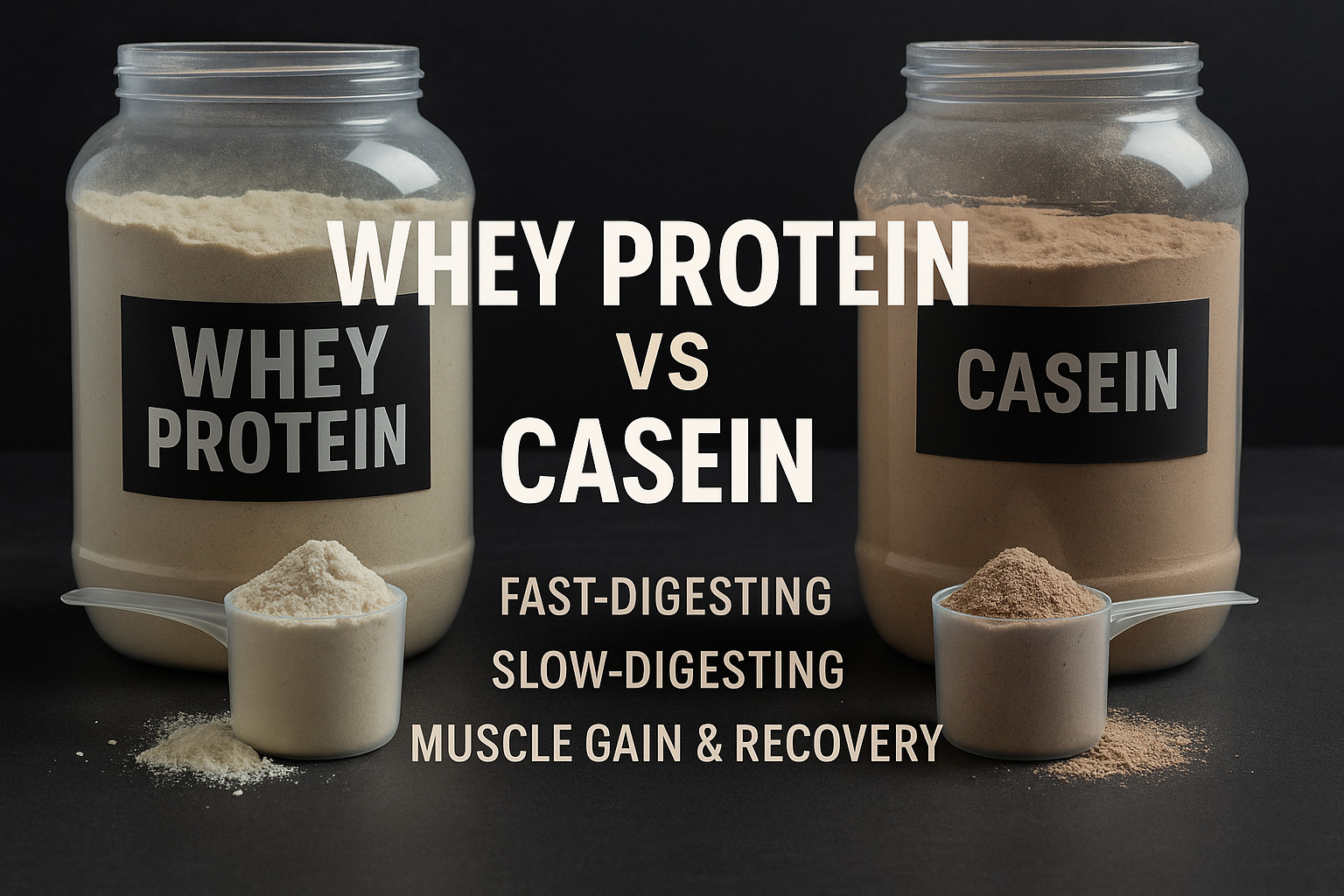- Your cart is empty
- Continue shopping

Whey protein vs casein is a common comparison in the world of fitness and nutrition. Each serves a unique role in muscle growth, recovery, and satiety. This comprehensive guide breaks down the science, usage timing, nutritional profiles, and expert advice to help you choose the right supplement for your goals.
Table of Contents
- Introduction
- What Is Whey Protein?
- What Is Casein?
- Digestion and Absorption Differences
- Ideal Timing for Each Type
- Goals and Performance Comparison
- Nutritional Breakdown
- Health Benefits of Each
- Who Should Take Whey vs. Casein?
- When to Combine Both
- Athlete Experiences
- Scientific Research and Evidence
- Compatibility with Diet Plans
- Medical Considerations and Warnings
- How to Read Supplement Labels
- Trusted Purchase Links
- Frequently Asked Questions (FAQs)
- Conclusion
1. Introduction
Whey protein vs casein is a common comparison in the world of fitness and nutrition. Each serves a unique role in muscle growth, recovery, and satiety. This comprehensive guide breaks down the science, usage timing, nutritional profiles, and expert advice to help you choose the right supplement for your goals.
2. What Is Whey Protein?
Whey protein is a fast-digesting protein derived from milk during the cheese-making process. It contains high levels of essential amino acids, particularly BCAAs, making it ideal for post-workout recovery.
Types:
- Whey Concentrate
- Whey Isolate
- Hydrolyzed Whey
Benefits:
- Rapid muscle recovery
- Stimulates muscle protein synthesis (MPS)
- Best used in the morning or after workouts
3. What Is Casein?
Casein protein makes up around 80% of milk protein and digests much more slowly than whey. It forms a gel-like substance in the stomach, releasing amino acids steadily over several hours.
Types:
- Micellar Casein (slowest digesting)
- Calcium Caseinate (slightly faster)
Benefits:
- Sustained muscle nourishment (6–8 hours)
- Great for nighttime use or during fasting
- Prevents muscle breakdown during long gaps
4. Digestion and Absorption Differences
| Factor | Whey Protein | Casein |
|---|---|---|
| Absorption Speed | Fast (20–30 mins) | Slow (6–8 hours) |
| Best Time | Post-workout | Before bed |
| Amino Acid Effect | Quick spike | Sustained release |
5. Ideal Timing for Each Type
- Whey: Post-workout, morning meals
- Casein: Nighttime, between meals, fasting phases
6. Goals and Performance Comparison
| Goal | Best Choice |
|---|---|
| Rapid Muscle Gain | Whey |
| Muscle Preservation | Casein |
| Appetite Control | Casein |
| Morning Performance | Whey |
7. Nutritional Breakdown
| Element | Whey (per 30g scoop) | Casein (per 30g scoop) |
|---|---|---|
| Protein | 24–26g | 22–24g |
| Fats | 1–2g | 1–3g |
| Carbs | 1–3g | 2–4g |
| Calories | 110–130 | 120–140 |
| BCAA | High | Moderate |
8. Health Benefits of Each
Whey:
- Supports immune function
- May reduce blood pressure
- Ideal for muscle growth
Casein:
- Enhances satiety
- Strengthens bones (high calcium)
- Reduces muscle degradation overnight
9. Who Should Take Whey vs. Casein?
Whey Protein: Beginners, athletes, post-workout users
Casein: People on cutting plans, intermittent fasting followers, nighttime users
10. When to Combine Both
For optimal results:
- Use whey post-workout for recovery
- Use casein before bed to protect muscle overnight
11. Athlete Experiences
“Whey gives me quick recovery, but casein helps me maintain muscle overnight. I use both daily.”
— Competitive bodybuilder
12. Scientific Research and Evidence
- AJCN study: Whey spikes MPS quickly; casein is better for anti-catabolic effect overnight.
- JSS research: Athletes using both had better muscle gains and composition than those using just one.
13. Compatibility with Diet Plans
- Keto: Low-carb formulas for both available
- Intermittent Fasting: Casein before fast, whey after
- Vegan Diets: Plant-based alternatives exist but less effective
14. Medical Considerations and Warnings
- Avoid overuse if you have kidney/liver issues
- Choose certified products only
- Watch for lactose intolerance and additives
15. How to Read Supplement Labels
Look for:
- Total protein per scoop
- BCAA content
- Sugar/sweeteners
- Certification labels (GMP, ISO, Informed Sport)
- Country of origin
16. Trusted Purchase Links
17. Frequently Asked Questions (FAQs)
Can I use both in one day? Yes.
Is casein fattening? No, if used properly.
Which is better for beginners? Whey is easier to start with.
18. Conclusion
There’s no one-size-fits-all answer. Both whey and casein are effective. Use each based on your fitness goals, daily schedule, and nutritional needs. Smart combinations lead to better muscle support and recovery.
